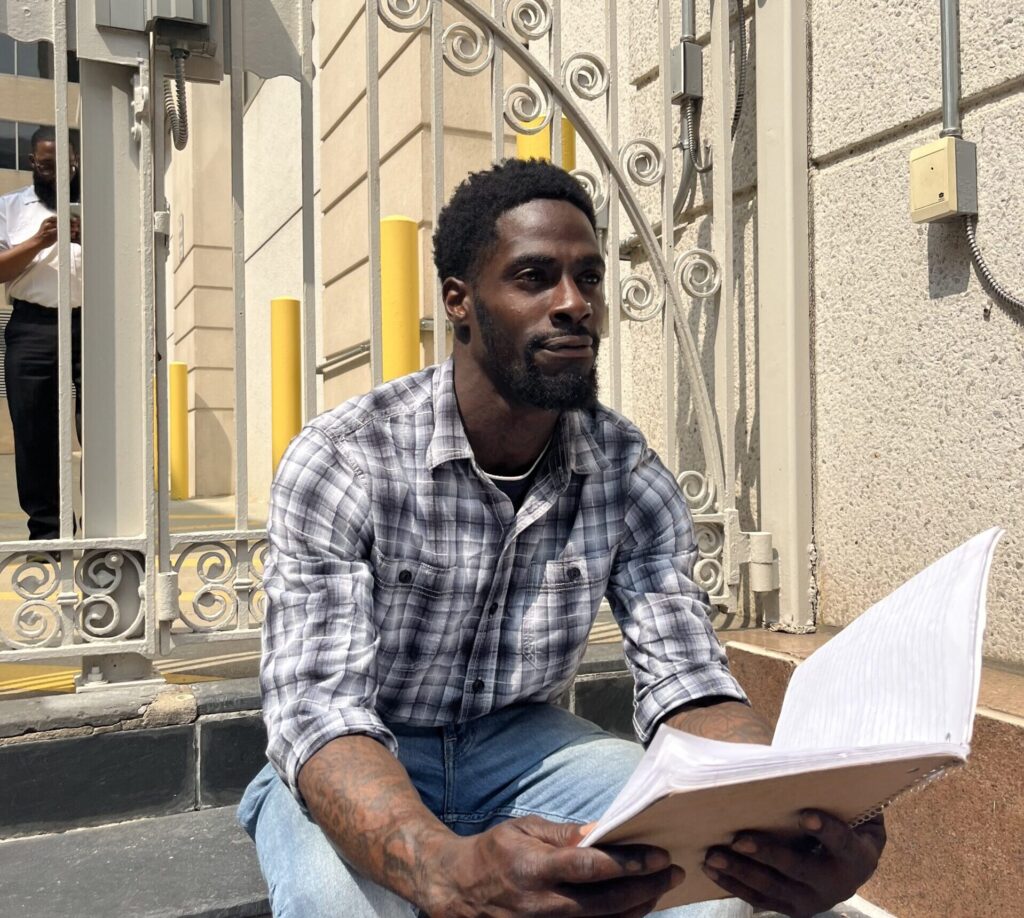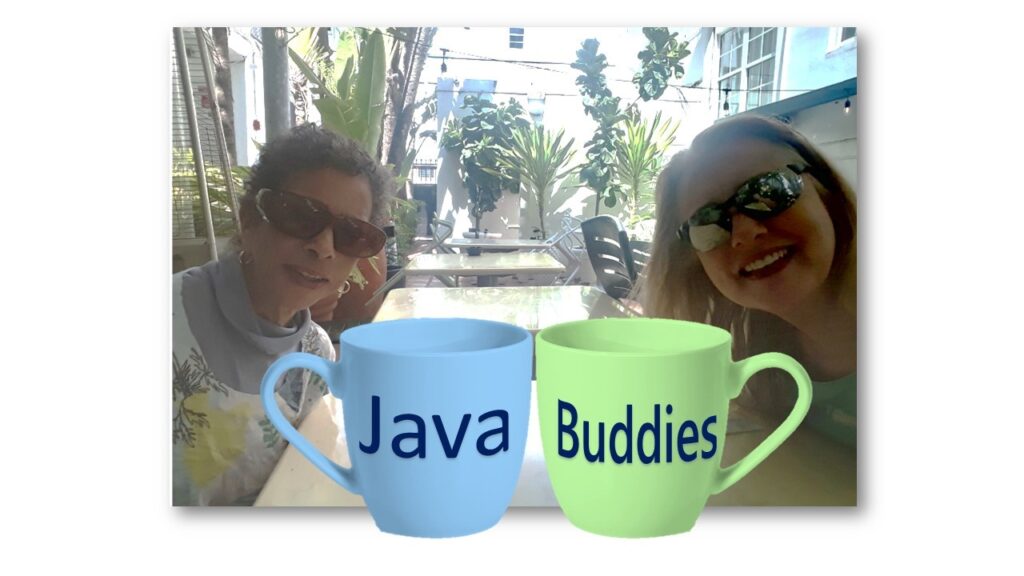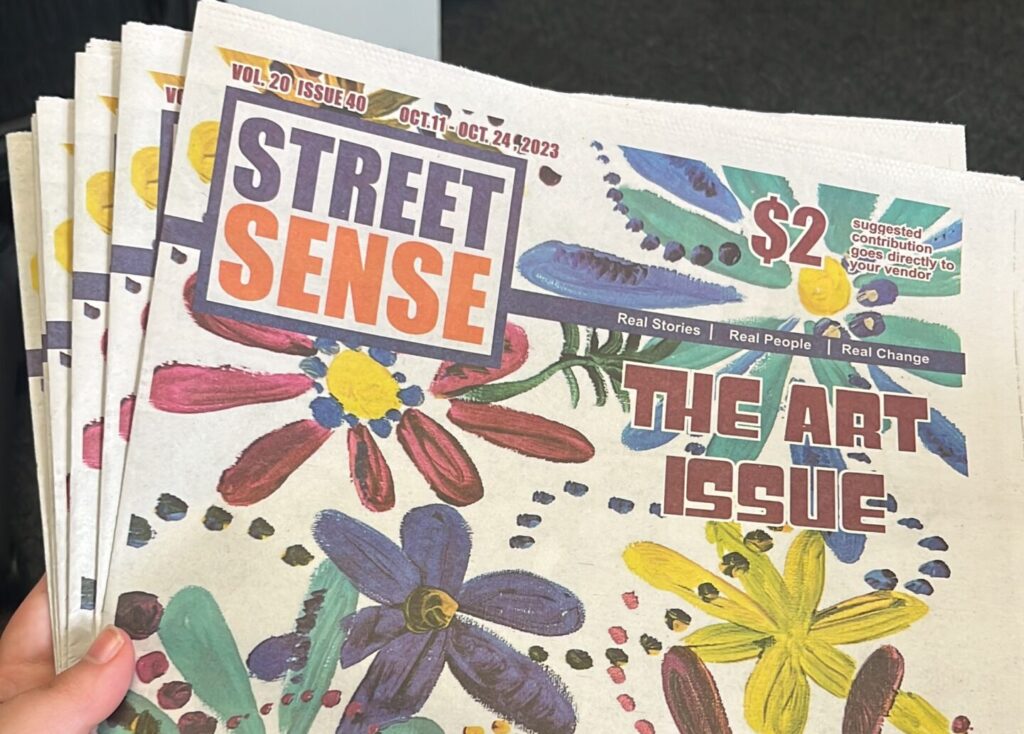When Carlos Carolina thinks of what he wants for his children, the message is simple: do good.
Carolina’s done a lot of good in his life, from helping people experience homelessness for over a decade, to spending weeks penning poems for Street Sense about identity and civil rights. But he hopes his children can do even more, and he wants to help make the world a place that will support them in that.
Carolina, 34, grew up in Southeast D.C. He received his GED while incarcerated in Maryland, and joined Street Sense Media in 2019. He always has his black notebook of poetry, excitedly sharing lines and ideas from it in conversation, including in this interview. Street Sense caught up with Carolina to talk about returning home after prison, his favorite spots in D.C. and his hopes for his children.
This conversation has been edited for length and clarity.
You’re always writing, and working on a new poem. What do you like to write about?
Really, I like to write about life, and I’m learning to be honest. I always wrote but I’m learning to be more of an established and respectful creative writer. So I mean, I might write something about a situation where I lost my mailbox key, or I might write about the stars and the moon, or I might want to write about love. I might want to write about how I’m learning about love to write about love, to know about love. So, there are a lot of things that I’m learning right now, it’s just writing and writing and it’s like taking me through my process of hopefully perseverance.
How did you start writing for Street Sense?
I met a lady named Ms. June Lewis. She was telling me about the papers, and I appreciate her so much for that, because if she ain’t never tell me I would never have came here and thought that I could sit down and write. Like I say in one of my writings about the homeless community, I say, “My goal is not to uphold but to uplift the people.” I don’t want to keep people at a state where they are constantly dependent or relying on. Like nah, I want to uplift you to the point where you can be independent and rely on your own hard work and your own craft. Some people got abilities, they just got to know how to utilize their abilities and their gifts in the way that it works for them.
What do you like to do outside of Street Sense?
I like to dance, I like to sing a little. I like to act. I like to draw. I like to bike, I like to skateboard, I love to go in the water. I just like to be active and do stuff that’s active. I’m really not like a TV person, if I watch TV it’s like sports, otherwise I’m more of an adventurous type person.
Do you have a favorite spot in the city?
I like The Yard area. I used to take my kids over there to play in the water. There’s a waterfall, This is my daughter’s favorite spot. [She often says] “Daddy, daddy can we go to the water?” and I’d be like “Which one?” and she’d be like “You know which one!”
My son is eight, my daughter is six. She is about to turn seven in August. My son’s about to turn nine this month. Yeah, I really miss them, because I do a lot of planning for them as well.
I like the Union Station area. That’s because I feel acquainted to that area. Because that’s where I was at when I was homeless. So it was just like I had people looking out for me and I’m looking out for people, we had an understanding, a bond amongst each other in a way that, even though we out here, we can still be out here and be out here together. There was one point in time I can remember, where the Union Station area was for the homeless people to go.
As of right now, to be honest with this whole homeless thing, I really feel like it’s a pandemic. I’m thinking of ways that further on down the line, I got daughters, I got nieces, I got my nephews, sons, how they don’t end up in this situation I’m in. I want a lot of these youngins to know, like for real, do good. And I don’t say that like I’m being funny, do good. Don’t look down on nobody. Because one mistake, and it don’t even gotta be a mistake, it could be a situation. It could be a situation that you ain’t even caused, but it calls for you to move your feet. You out here with the same people you were looking down on.
Can I tell like my experience? Before I became homeless, I used to work, I worked many jobs but I think when I started to realize homelessness, I was working at a McDonalds, and I worked overnight, I got off at 5 in the morning. So I prepped the breakfast food, the dinner food we’d throw away. But instead of throwing away the food, I might bring some food home. So as I walked through the streets, and I had Big Macs, double cheeseburgers, McChickens, no telling what I might have, I got it though. And I’m not selling this, I just give it. And then circumstances, you know, led me to be out here in the same predicament that the same people I could have been looking down on, “Go get a job, why are you asking me for food?” Man, I’m glad I did not have that mentality. Cause now I’m right out here with these same people, but it was just like, man we know you.
Just coming up, I always checked in with people that was homeless. I have friends out here, I’d be like “man, I might stay out here with y’all for the night, or if I can get you to come over to my mom’s house, girl’s house, sister’s house, get you out the streets, take a shower.” To be honest, as of right now, I wouldn’t take it to that extent, that’s why I’m learning the proper resource places. Instead of me taking you somewhere I could probably show you the best place to go, but younger [people] don’t think that.
How long were you homeless for?
A couple times. I was on probation in Maryland and it got to a point where I feel as though it was too much for me, so I cut my ankle monitor off, came back to D.C., and it was just like from that point on, I was out here. Everybody got they different stories, when you got the police looking for you, you just don’t want to be over at your folk’s house, so that’s what took me to being homeless. I’m glad I got people who care about me, and if I didn’t see it then I see it now.
What was it like leaving prison?
It was hard and confusing. I’m writing about bringing more effective programs to the penal system so when inmates come home it don’t be hard and they don’t be confused. Because once you’ve gone away from society for a certain period of time, you have to re-learn how to become a productive citizen. But for the most part, it’s like coming home not knowing what’s going on, and really having no sense of direction, not knowing what laws has changed, you tend to come out and go for what you know, if you don’t have a strong game plan. I noticed every time I got out, within 90 days I’m back in jail.
And I learned this by reading books like “The New Jim Crow” by Michelle Alexander. Once I started to learn about the prison system and what it is, I was angry. And that’s when I really became passionate about trying to come up with programs. No tricks, like no trying to get you out and get you back in, like for real come out and be part of the society where you can add to the economy and become a productive person.
To be honest, that’s what really saved me for real — prison. Jails, prisons, programs. If it wasn’t for the programs — cause I did like volunteer appreciation, conflict resolution, anger management, whatever program I could get into — that kept me out of a lot of the whatever, whatever.
What are you looking forward to?
I’m excited for our poetry slams, for our plays, and to be honest, for some music probably.
Carolina also wanted to share a poem with readers, which he read out loud.
Still looking for my mailbox key.
And you know what I think?
That it’s in my wallet,
the one with the pocket.
And last week I lost it, I must have dropped it.
And ever since then, my world’s been down,
because also my ID and library cards haven’t been found.
And guess where it’s at?
In my wallet,
the one with the pocket.
And since then I went and applied for a new ID
that come in the mail.
But still, I’m looking for my mailbox key.








